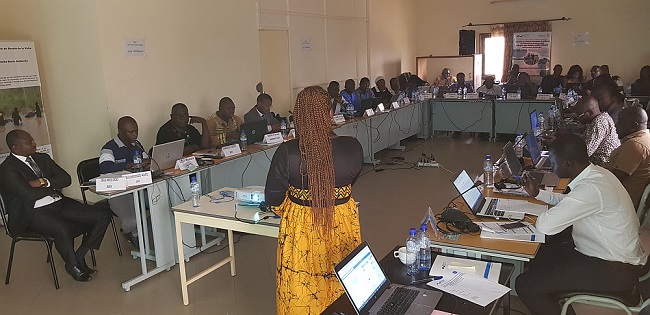About 20 media women and men from Benin, Burkina Faso, Côte d’Ivoire, Ghana, Mali, Niger and Togo took part in the regional workshop on “Integrated Drought and Flood Management: Contribution of media men/women in advocacy and awareness-raising in West Africa”.

The meeting, co-organised by Global Water Partnership West Africa (GWP-WA), the Volta Basin Authority (VBA) and the Country Water Partnership (CWP) of Burkina Faso, was held from November 20 to 22, 2018 in Ouagadougou, Burkina Faso, at the premises of the VBA Executive Directorate.
At the end of the workshop, all participants indicated that they had a better understanding of the different concepts of droughts, floods and the issues related to their integrated management. They indicated that they now have a good understanding of the involvement and role of the media in promoting integrated drought and flood management in West Africa in their respective countries for sustainable development.
The participants particularly noted the good organisation of the workshop, which made it possible to clarify the concepts during the presentations and then reinforce the understanding of these concepts in the field by visiting pilot sites. Finally, the knowledge gained, and lessons learned from the visit enabled media actors to produce press articles and produce radio and TV magazines on the spot.
“The field visit is always an enriching initiative that allows us to gather concrete elements of information in addition to connecting with experts,” said one of the participants.
“When I came here, I thought it must be another workshop like the dozens we have attended in the past,” said Aboubakar Sidiki Sylla of the Ivorian Radio and Television (RTI). “But I must admit that the workshop in Ouagadougou is quite different. A very good experience that combines theory, field visit and journalistic production practice”.
Joachim Batao of Burkina Faso’s online newspaper, Burkina Demain, said: “This workshop is undoubtedly the best workshop for journalists I have attended so far”.
Jasmine Arku of the Ghanaian Graphic News Paper added at the same time as her compatriot Samuel Asamoah of Metro TV, that the session was “an eye opener”. Being from the very humid south of the country, the field visit to the Ramitenga site where solar energy is used for drip irrigation and Komki Ipala with the successful experience of restoring degraded soil for agroforestry, allowed them to be confronted with real situations that are replicable in the northern part of their country, Ghana.
“The workshop allowed me to know that floods, if well managed, did not only have negative effects,” concludes Arku.
The contact with media women and men during the workshop made it possible to change the perception that researchers had of journalists.
“I understood that we need as researchers to make an effort to involve journalists in our work from the outset if we want our results to be known and understood by the population and decision-makers,” said Gnenakantanhan Coulibaly, a doctoral student at 2IE, who specialises in flood management.
Mr. Alassane Toure, representative of the consultant in charge of developing the national drought management plan in Burkina Faso, explained that he has “understood all the benefits for a specialist to approach media men and women in order to create mutual trust that can facilitate a good understanding of each other’s functions and work”.
To reinforce the achievements of the Ouagadougou workshop, the participants recommended, among other things, that:
- Such practical thematic workshops should be organised at the regional level and, if possible, in the countries to enable journalists to familiarize themselves with the different concepts;
- Partner organisations pool their efforts and resources to provide better training for the better involvement of media women and men in the sustainable development of the region;
- That participants at the workshop be integrated into the network of journalists already trained by GWP-WA and its partners since 2007 called “ShareInfo”;
- The formalisation with VBA of the network of journalists of the Volta Basin to support the communication efforts of the Executive Directorate towards the populations and decision-makers of the member countries of the Volta Basin; this could be achieved through the establishment and regular animation of a media forum like the basin stakeholders’ forum.
At the end of the workshop, all participants committed themselves to making productions to inform, raise awareness and educate populations and decision-makers on the issues and challenges related to droughts and floods from the documentation and with the resource persons available at the workshop. Personal commitments for the post-workshop period range from maintaining collaboration with Country Water Partnerships (CWPs) in countries to creating sections in the media or even creating media (TV, websites or radio) specialising in environmental issues, especially online.
Participants believe that the objectives of the workshop were largely achieved beyond their expectations.
Officials of GWP-WA and VBA said that they are committed to supporting the media in their efforts to inform and educate the population on all issues related to integrated natural resources management. Both organisations called on participants and media women and men in general to get closer to the CWPs (for GWP) and national focal points (for VBA) for a better understanding of the issues discussed at the national level.
